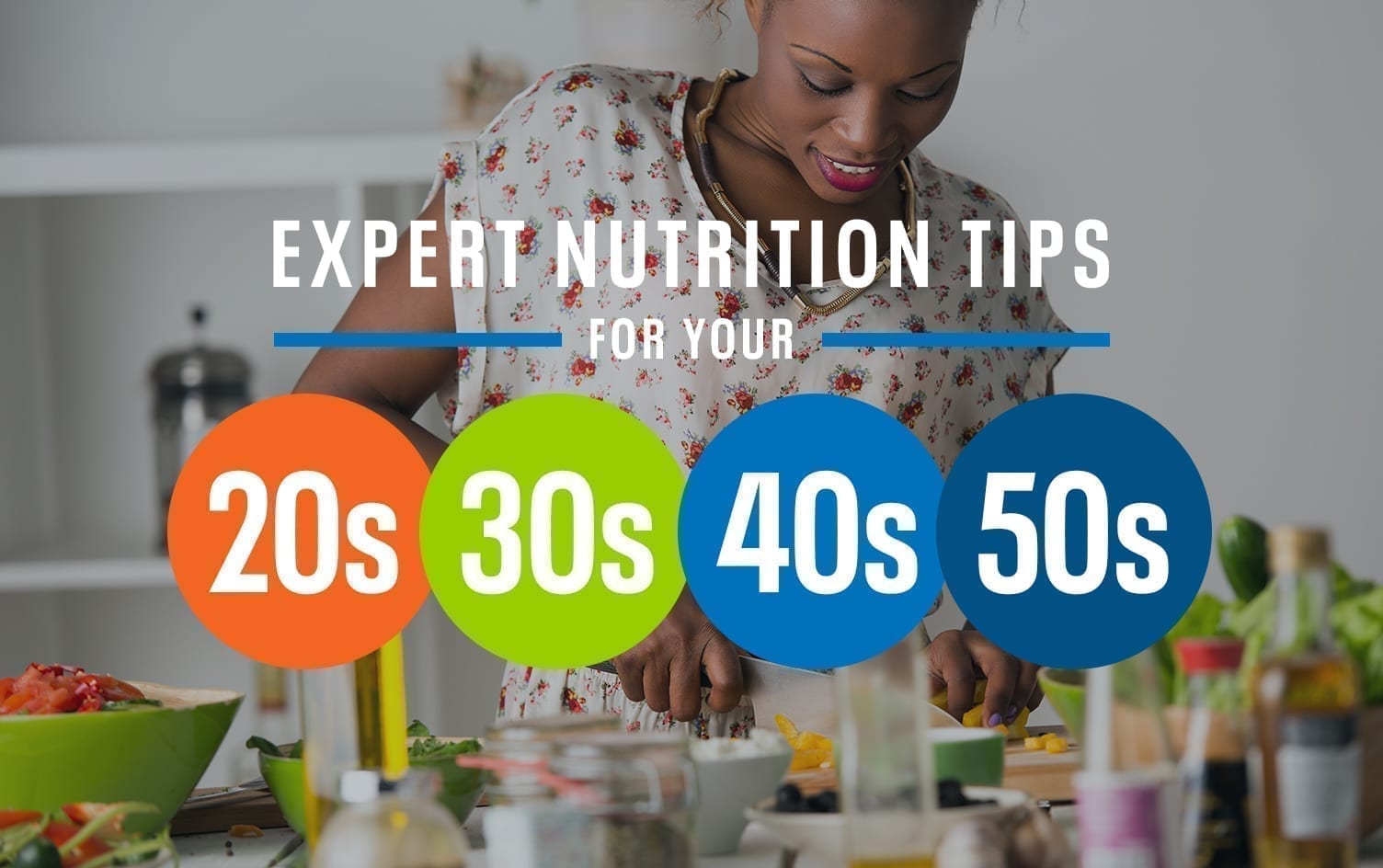Our bodies change as we age, so our fitness and nutritional habits should adapt, too. At a younger age, the body naturally holds on to more lean muscle mass, which supports a strong metabolism. It’s also the perfect time to create healthy eating habits you can carry with you long term. Later in life, the focus shifts toward maintaining consistency and preventing muscle mass loss.

A lot of our experiences in our 20s related to food, nutrition and body image can deeply impact health and well-being for decades to come. For example, instead of focusing on specific foods as good or bad, now is the time to put them all on a neutral playing field. If you’re struggling with disordered eating, make it a priority to seek help from a registered dietitian, therapist or other healthcare professional. Doing the hard work to create a positive relationship with food early on can free years of life without constant thoughts of food and body dissatisfaction.
It’s also important to develop healthy habits to take with you into the next decades. Here are a few suggestions:
- Learn to cook: Perhaps you’re living on your own for the first time, and relying too heavily on takeout or packaged convenience foods that are often lower in vegetables and higher in sodium, saturated fat, preservatives and refined carbohydrates. Over time, this can negatively affect health. Learning some cooking basics, either by taking classes, doing some YouTube investigating, or cookbook reading helps diversify the diet and make it fun, too.
- Experiment outside your comfort zone: Now is the time to try new foods and cuisines, which can be more challenging as we age and become more set in our ways. Try new-to-you vegetables like Brussels sprouts, squash, collard greens, radishes or whole grains like quinoa or farro or teff. Play around with different cooking methods, like roasting, baking or sauteeing, to make certain veggies more palatable and delicious.

Whether you’re starting or growing a family, advancing in your career, or both, this is the decade when it seems there are never enough hours in the day, and self-care (including proper nutrition) can fall by the wayside. Check-in with yourself regularly to make sure you’re prioritizing the following:
- Regular meals: Hectic schedules can make it easy to skip meals or grab something unsatisfying on-the-go. This can lead to blood sugar crashes, feeling ‘hangry’ and eventually overeating or bingeing — and the cycle often repeats itself. Aim to eat a well-balanced meal that includes protein, fiber, carbohydrates and healthy fat every 3-4 hours. This may take some planning or meal prepping on the weekends, but it’s worth it.
- Stress management: Taking care of your mental health makes you a better employee, boss, mom, dad, partner, friend, etc. Whatever stress-management tools work best for you — like journaling, therapy, exercise, meditation — make time for them on a regular basis.
- Vegetables: We can all benefit from adding more veggies to our meals; research shows plant-based diets can decrease the risk of both heart disease and cancer. Other research also shows plant-based eating may help prevent and manage Type 2 diabetes, which is on the rise. For women who are trying to become pregnant (or are pregnant), vegetables like broccoli, leafy greens and Brussels sprouts are good sources of folate, which is key for a baby’s growth and development.

Starting in your late 30s and early 40s, when the body’s bone mass peaks, women slowly start to lose calcium from their bones. This, combined with the reduction of estrogen that starts with perimenopause, increases risk for osteopenia and osteoporosis. Women in this age category should consider taking a vitamin D supplement because vitamin D is in so few foods, and consume plenty of bone-building calcium. Good sources include:
- Cheese
- Yogurt
- Canned salmon or sardines (due to the edible bones)
- Beans and lentils
- Chia and sesame seeds
- Dark leafy greens like kale and collard greens
- Cow’s milk and fortified plant milks
- Soy foods like edamame and tofu
Menopause can be challenging for women because it often comes with changes to body composition. When estrogen is reduced, weight gain in the stomach area is common. This can be uncomfortable, and many women have the urge to diet and restrict food intake to combat these changes. However, weight gain during menopause is a natural protective mechanism and completely normal. The body fights against dietary restriction and weight-loss attempts every step of the way during this time, which can also have negative effects on metabolism. Rather, nourishing the body with a variety of foods and engaging in activities that help women feel good in their current bodies is the best approach. This could be through various forms of exercise, meditation and journaling.

We lose muscle mass as we age, and this notably increases after age 50. Loss of muscle mass over time can result in reduced ability to perform everyday activities like walking, cleaning, yard work and errands, as well as exercise. The good news is consuming adequate protein sources, in addition to staying physically active, can help maintain muscle mass. Resistance training like yoga, Pilates and weightlifting is also especially helpful. Focus on including a quality protein source with each meal and snack such as:
- Chicken or turkey
- Fish
- Tofu or tempeh
- Greek yogurt
- Eggs
- Nuts and seeds
- Beans
- Cottage cheese
- Lean red meat (occasionally)
Make progress every day while you work on mini fitness and nutrition goals, like walking more steps or learning to track macros. Go to “Plans” in the MyFitnessPal app for daily coaching and easy-to-follow tasks to keep you motivated.




